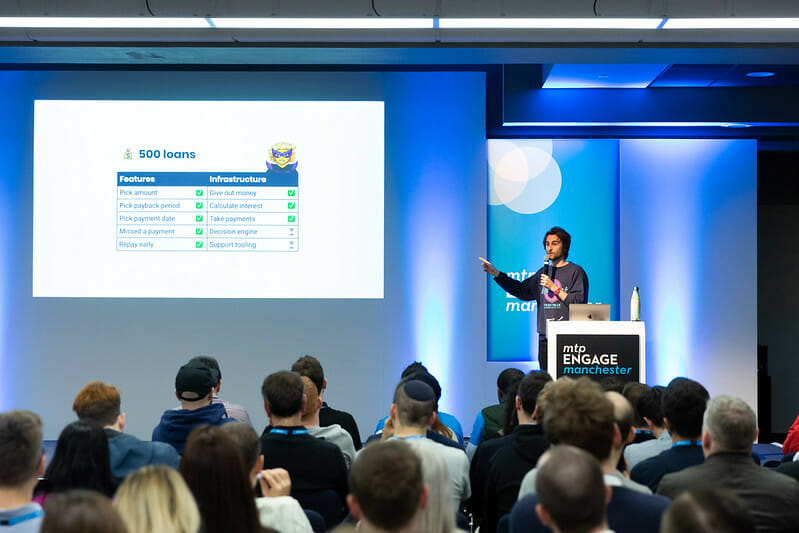How to Grow and Scale a High-Functioning Team by Richard Cadman [Mind the Product]

In this talk, Richard Cadman, Principal Product Manager at Monzo, helps us think through practical steps we need to take to grow and scale a high-functioning team.
Using examples from his experience at Monzo, where he built his team up from 10 to 40 people, he covered:
- How to get teams engaged
- How to set teams up for success
- What to do when you get it wrong (which you will)
Get Teams Engaged
Richard joined Monzo’s lending team where he discovered that “in many scenarios, lending can hinder rather than help people”. This, he says, is because most people would rather build products that are designed to help rather than hurt others. The idea of a lending product can, therefore, be a significant de-motivating factor.
To address this, Richard worked hard to remind people of Monzo’s motivations – the why behind the product they were building. This focus, he says, is critical for the team dynamics but also because every choice they make in the development process will bake in context and assumptions. Put simply, the more they know, and the more they care about the problem they’re trying to solve, the better the result will be.
 So in practice, how do you do this? Richard outlined four key activities:
So in practice, how do you do this? Richard outlined four key activities:
- Set clear team business goals – without this, it’s very difficult to properly prioritise work, or decide where to focus as a team.
- Build customer-centric principles – a Monzo example is ‘putting the lender in control’ which can be seen in features such as delayed overdraft charges.
- Bring visibility to the customer – we all know the teams that build the best products are the ones who obsess over customers (most people can tell when a product has been carefully crafted with their needs in mind). Scaling this customer visibility creates a deep understanding and empathy across the team and can be incredibly impactful. At Monzo, sharing links to customer conversations – in real-time – with the team was a very effective way to build rapid understanding and empathy.
- Accountability and Repetition – If you have the best motivations, goals and objectives and never refer back to them, you lose all the magic they can help to create. Accountability and repetition will help you turn all your good intentions into real impact.
Set Teams up for Success
As Richard’s team grew, he admits it became challenging to make sure everyone was working on the highest leverage thing, and moving as fast as they could. This, if left unchecked, could significantly diminish the team’s impact.
To address this, they worked to reduce the complexity of what we were trying to achieve. They did this by breaking the team down into independent levers using a split tree. And, by assigning different teams with the responsibility for specific parts of the whole product set. This meant, for example, that one team would focus on take-up (the percentage of people eligible for a loan that choose to borrow with Monzo), whilst another focused on FinDiffs – helping people with financial difficulties to get back on track.
He warns, however, that having this level of clarity on purpose and organisation, is only effective when those teams are truly empowered to create and drive change in their respective areas. So, giving each squad as much autonomy as possible was critical for success here. As Richard explained, “by giving people autonomy, they know that no one else will make decisions or do the work for them. This is empowering, probably mildly intimidating, and it also limits the opportunity for blockers”.
Learn to say Sorry
This is so simple, but it’s too often overlooked. Some of the best leader’s say sorry when they get things wrong, both to their customers and staff.
 Richard gives three top tips for saying sorry well:
Richard gives three top tips for saying sorry well:
- Give warning: Let people know that you’re still in the early stages and things may break. This tells people what to expect, and reflects proactivity on your part.
- Be human and be open: Have a continuous open dialogue with your customers, as yourself, not as the company. The impact of this is that people are more ‘bought in’ and will likely contribute more because they feel they’re shaping the product. They’re also likely to be more forgiving because they realise they’re dealing with an actual person instead of a faceless organisation.
- Apologise well: This goes without saying and yet it’ something that needs to be said. People are forgiving when we own up to our mistakes, so put down your defences and say sorry. As Richard explains, “people are surprisingly understanding if you give a proper apology, and the transparency can often buy you a lot of trust and loyalty”.
The post How to Grow and Scale a High-Functioning Team by Richard Cadman appeared first on Mind the Product.
Source: Mind the Product https://www.mindtheproduct.com/how-to-grow-and-scale-a-high-functioning-team-by-richard-cadman/

Post a Comment